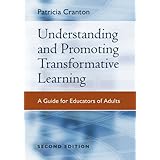
Average Reviews:

(More customer reviews)Cranton gives us great strategies for developing self-awareness as educators. We can become aware of our assumptions by trouble-shooting our own ideas with a suggested list from Cranton: write critical incidents (episodes in our own lives that created new perspectives), keeping journals, writing life histories, conducting criteria analysis, and engaging in a crisis-decision simulation. Cranton says discussions with colleagues and friends may be enough of an impetus for explicating assumptions.When we question the what, how and whys' we can become reflective practioners. The next step is integrating these assumptions into an informed theory of practice. Personal growth for the practioner and the adult learner is our goal.Cranton uses simple language to tell us what the needs of the adult learner are. Her book defines educators themselves as "transformative learners". Today's ideas of educators as facilitators is not just a trendy idea for Cranton. She gives us great ideas on how to revamp our teaching.We are exposed to the different types of adult learning. Cranton explains subject learning, consumer-oriented learning and emancipatory learning. As a fundamental goal of education, emancipatory learning defines the role of education in society.We see Cranton's name a lot in adult learning materials and she in considered an authority. You won't be disappointed with her matter-of-fact way of presenting information. She does not hoard information, she shares everything available to cover the topics at hand. In this "information age" Cranton is out there "fighting the war".
Click Here to see more reviews about: Understanding and Promoting Transformative Learning: A Guide for Educators of Adults

No comments:
Post a Comment